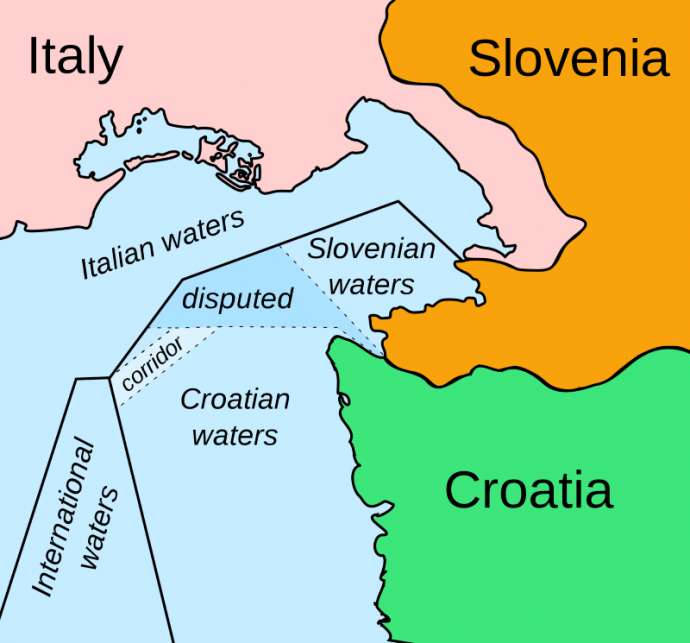STA, 8 July 2019 - Slovenia reiterated its stance that by not implementing the 2017 border arbitration award, Croatia is violating EU law, as it presented its view in an oral hearing of the European Court of Justice (ECJ) about the admissibility of Slovenia's lawsuit against Croatia.
The court convened on Monday to deliberate on Croatia's December 2018 arguments that border arbitration between Slovenia and Croatia does not fall under the ECJ's jurisdiction, because borders are a matter of international rather than EU law.
The EJC advocate general will present his legal opinion on the case on 6 November.
Presenting Croatia's stance to ECJ judges, lawyer Jemima Stratford said the case did not fall under the court's jurisdiction and the court should not interfere in bilateral disputes.
Bilateral territorial disputes are outside the EU court's jurisdiction, even if they have a bearing on the implementation of EU law, she said.
She added that the only possible legal basis for the legal action would be Article 273 of the Lisbon Treaty.
The article enables EU members to bring a dispute before the ECJ in a consensual manner. It relates to disputes which are not strictly EU law, but are relevant for member states and the EU.
Stratford explained that Croatia did not recognise the border arbitration award because it had withdrawn from the arbitration process before it was declared.
Although Slovenia claims the arbitration award is a fact, it is also a fact that the award is not being implemented on the ground, she added.
Croatia therefore believes Slovenia is creating a fictitious dispute, she said, adding Croatia and Slovenia were acting in line with their respective legal understanding of their borders.
The apple of contention is therefore the course of the border, not the interpretation of EU law, Croatia's representative said.
Presenting Slovenia's stance, agent Maja Menard said the lawsuit was not about the border, because the border had been set in the 2017 award, which was final and self-implementable, and the two countries were obliged to respect it.
Menard also reiterated that by not recognising the arbitration award, Croatia was violating EU rules and policies.
In the lawsuit, which is based on Article 259 of the Lisbon Treaty, Slovenia proposes the ECJ establish that Croatia violated Articles 2 and 4, which stress the importance of the rule of law and sincere cooperation between member states.
Slovenia also claims Croatia is violating the common fisheries policy, Schengen rules about the free movement of people and a directive on maritime spatial planning.
Menard stressed that a decision of international law was in the ECJ's jurisdiction if the decision was necessary to interpret EU law, to which it referred.
Following the presentation of both countries' positions, judges asked several questions, many about a note concerning the border arbitration in Croatia's EU accession agreement.
The note in annex 3, chapter 5, refers to fisheries, saying the fisheries regimes will start applying when the arbitration award reached on the basis of the arbitration agreement signed by Slovenia and Croatia on 4 November 2009 is fully implemented.
Judge rapporteur Christopher Vajda thus asked Croatia about it in relation to the country's argument that the ECJ had no jurisdiction in the case.
Stratford said the note merely set the time frame of the implementation of the fisheries regime.
But Slovenia's lawyer Jean-Marc Thouvenin explained the note introduced the arbitration agreement and what stemmed from it into EU law, which made it part of EU law.
Italian judge Lucia Serena Rossi said this was really just a note, but a very important one. As such it is part of primary EU law and thus falls under the ECJ's jurisdiction.
Once the two-and-a-half-hour oral hearing was over, Advocate General Priit Pikamäe announced he would present his submissions - his independent legal opinion - on 6 November.
If the lawsuit is admitted, the court will start to deliberate on its content.
Speaking to the press after the hearing, Marko Vrevc from Slovenian Foreign Ministry said he would be surprised if the court decided not to admit the lawsuit.
Menard said the hearing had gone according to plans and the debate had been intense as expected. She has a positive feeling about it since Slovenia had an opportunity to answer the judges' questions in detail.
The agent expects the court's decision on the admissibility at the start of 2020.
She was also not surprised Croatia had referred to Article 273 during the hearing, noting this implied "a quasi arbitration process which requires both sides' consent, but we insist the border dispute is settled, so we need no consensus on another attempt to solve it".






